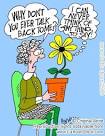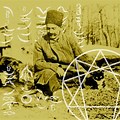..






Plants That Feel And Speak - 2
When you think about it, this is not dissimilar to the way horticulturists and gardeners view plants in their care. Older plants possess an authority that seedlings do not. Also, each species has its own nature, and individuals within the species have their particular character.
We speak of animals in much the same way, describing a breed of dog as generally 'good' with children', but individuals within the species may not be good, with children in general, or with a particular child. Many Western gardeners 'tune in' to their plants in essentially the same way as do indigenous peoples. Looking at a bed of roses, next to a bed of hollyhocks, we might perceive each species to have a different emotional tone.
Each species looks different , grows differently, with different kinetic qualities and character - in much the same way as people have different characters. The more species we grow , and the longer we work with them, so our 'instinct ' about plants develops (as instinct develops over time when using essential oils
The difference between our approach and that of indigenous peoples is the way we learn about plants. We spend time reading gardening books , while they sit with a plant for hours, days even, getting to know it. They'll respectfully bring it little presents, in gratitude for what it offers and to let the plant know they care. They go to plants as a pupil goes to a wise person, to learn. Western horticulturists, on the other hand , often feel that they are the holders of information, and that it is their job to control the plant, which they see as their property.
We know, of course, from 'companion gardening' that plants can influence each other in terms of preventing pests and disease. This is often accomplished through scent, as aroma molecules from the plant waft over another, exerting their beneficial influence. Stephen Harrod Buhner relates an interesting anecdote on this subject in Sacred Plant medicine.
He was sitting with a lichen called usnea, which has powerful antibiotic qualities when suddenly the usually subtle 'feeling tone' of the usnea increased in intensity, Buhner felt his 'personal boundries' dissolving, and the plant appeared as a youngish man. The plant-man told him that usnea's primary role is to keep the earth's lung system healthy, by being an antibiotic for the trees on which it grows, adding that as a by-product of this intended role, usnea can also be used to treat individual human lung infections.
Imagine how much more we could learn about plant interaction, and how many new medicines we could discover, if more of us could hear what plants have to say. Plants are sensitive, sentient beings.
There has been a great deal of research in this area, starting in 1966 with the work of Cleve Backster, then a New York expert in the field of lie-detection working for law-enforcement agencies. One classic Backster experiment involved plant murder. He put two plants next to each other in a room, along with six of his students, who each picked a piece of paper from a hat; one of the pieces of paper carried instructions for the murder. The people with the five 'blank ' papers left the room with Backster.
In the room the 'murderer' ripped one of the plants to shreds . Backster then returned, attached the remaining plant to a polygraph machine, and called the students into the room, one by one. There was no response on the machine to the five innocent students, but when the murderer entered the pen flew across the paper as the 'silent witness' recognized the guilty party.
The implications of Backster's work on plants are staggering enough, but he has also done experiments with other life forms, including eggs, shrimps, and human mouth cells - the implications of which are equally amazing. Backster had to conclude that all nature is essentially unified and not separate.
The planet earth hums. It emits a low-frequency radio signal, the earth's 'vibration' which is known as the Shumann resonance, and it can be detected coming from trees. Researchers in America were curious to know whether this vibration could be altered with human thought and feeling, and connected an oak tree to a machine described as being not unlike those used to measure brainwaves in humans.
A group of people circled the tree and saying a traditional native American prayer, sent it love. The charts reportedly went off the scale. Although the measurements couldn't indicate whether the tree was happy to receive this love, or whether it wanted everyone to go away, clearly some form of interaction was taking place.
Plants respond to human thought, and to the human energy field . You can prove it for yourself in the following thought experiment devised by Marcel Vogel. Pick three leaves from the same tree or plant band place them by the side of your bed. (Vogel put them on glass, presumably so that he could view the underside without touching the leaves , but a sheet of paper will do.)
Each morning when you wake, concentrate on just two of the leaves , sending them love and pleading with them to live. Imagine them green and healthy-looking. Ignore the third leaf. don't touch any of them. After seven days the two chosen leaves should look fresh, while the ignored leaf should be shrivelled.
Do the experiment when you wake because that's when you're most physically and mentally relaxed. It's absolutely vital to approach this with a pure heart, because plants know what you think. Don't try to fool them because you'll only be fooling yourself. Expect the experiment to work.
Another classic experiment was originally devised by mathematician and healer Daphne Beall. Fill a container with water and energize the water by putting both hands around the container, without touching it. Relax and visualize white-light energy coming out of your hands into the container. Imagine the water becoming bright white; do this for ten minutes. Then put an organic, non-genetically manipulated tomato in the water.
Fill a second container with water, and put another similar tomato in that container without giving it any thought. Leave both containers overnight and in the morning take the tomatoes out of the water and place them somewhere, where they can sit for two weeks without being moved . make sure you have a way of remembering which is which. The tomato placed so briefly in the energized water will prove to have a much greater life span.
An energy connects us to plants. in some people the energy is very obvious, when they transform a neglected piece of earth, with fairy dust, into a resplendent garden. We call this 'having a green thumb'. Almost everybody, natural gardeners or not, have empathy for the glory of nature.
Human-plant interaction involves the study of light, physics, astrophysics, metaphysics, botany, biology, harmonics, electromagnetics, hydrology, minerology, and a dozen other things, including neurology, philosophy, spirituality, theology and psychology, to name but a few. Perhaps that is why it is so little researched - we don't know whose academic territory it is! The answer may be of course that it is everyone's territory, because there is only one territory, in that we are all part of the connecting whole.
Reference: Fragrant Heavens/V. Worwood
Articles-Latest
- Koran burning conviction sparks fury as blasphemy law 'returns to UK'
- Robert Francis Prevost - Pope Leo XIV
- Pope Francis' death follows recent health challenges. Here's what we know about how he died.
- Easter April 2025 - international Celebrations
- The Rule of the twelve psalms -Worthy is the Lamb
- Religion in Africa Before Christianity and Islam
- 6 The Origin of Yahweh
- Dumo Di Milano
- What Did the Crow Tribe Believe In: Discover The Beliefs!
- 7 Reasons Historic Christianity Rejects the Book of Enoch
- 8 Breathtaking Mountain Monasteries Around the World
- Ethiopian Bible is oldest and most complete on earth
- Muhammad Muhammad was a prophet and founder of Islam.
- World Day of the Poor – SVP Christmas Campaign 2024
- Pope Francis to open 5 sacred portals on Christmas Eve — for a ritual that’s never been done before
- The 144,000 in Revelation
- Over 73 dead bodies 'used for meditation', 600 crocs in a pond, found in two Thai temples
- Occultism: Western Occult Tradition
- What is a Mudra
- Blood Sacrifices: Ancient Rituals of Life and Death
Articles-Most Read
- Home
- Let There Be Light
- Plants that feel and Speak
- The Singing Forest
- The Singing Forest-2
- Introduction
- Meditation
- Using Essential Oils for Spiritual Connection
- Heaven Scent
- Plants that Feel and Speak-2
- Purification
- Making the Spiritual Connection
- Anointing
- Essential Oils: The unseen Energies
- The Sanctity of Plants
- The Aroma Of Worship-Foreward
- The Aroma Of Worship - Introduction
- Methods Of Use
- Spiritual Blending
- Handling and Storage






